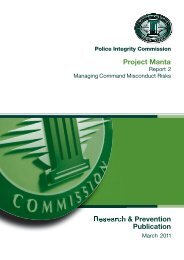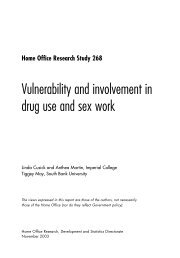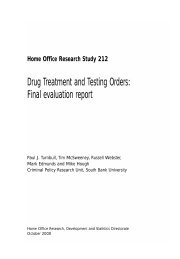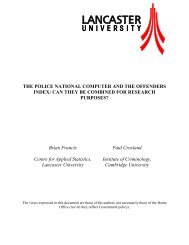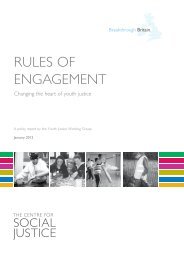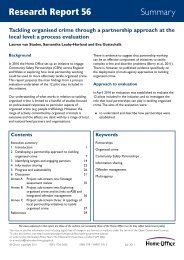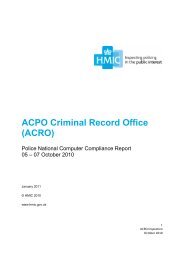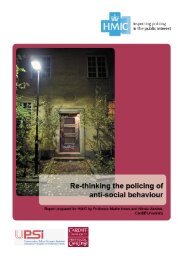Policing Large Scale Disorder: Lessons from the disturbances of ...
Policing Large Scale Disorder: Lessons from the disturbances of ...
Policing Large Scale Disorder: Lessons from the disturbances of ...
Create successful ePaper yourself
Turn your PDF publications into a flip-book with our unique Google optimized e-Paper software.
Home Affairs Committee: Evidence Ev w55<br />
There seemed to be agreement that <strong>the</strong> immediate steps were to clean up Croydon and compensate those<br />
who need it. More long term solutions to <strong>the</strong> problems involved included suggestions such as: <strong>the</strong> police need<br />
to engage with <strong>the</strong> community in a more positive way, and <strong>the</strong> youth need more services provided to <strong>the</strong>m.<br />
Croydon Xpress, Young Peoples BIG Debate Event<br />
Young people <strong>from</strong> Croydon’s Xpress project chaired a debate about <strong>the</strong> Croydon riots on Thursday 1<br />
September 2011.<br />
Hosted at <strong>the</strong> CVA Resource Centre, West Croydon, residents were invited to put questions to a panel which<br />
included Croydon North MP Malcolm Wicks, Councillor Sara Bashford who was representing Gavin Barwell<br />
MP, and Chief Inspector Mark Nanji.<br />
Chief Inspector Nanji revealed less than 100 police <strong>of</strong>ficers were on <strong>the</strong> streets on 8 August, out <strong>of</strong> a force<br />
<strong>of</strong> approximately 700 <strong>of</strong>ficers.<br />
He denied claims Croydon police had been “caught with <strong>the</strong>ir trousers down,” and were unable to deal with<br />
major problems, instead praising his <strong>of</strong>ficers for <strong>the</strong>ir bravery.<br />
Malcolm Wicks MP, repeated his call for a “minute by minute” inquiry into what he described as a “policing<br />
failure,” and said <strong>the</strong> Government were wrong to go ahead with police cuts.<br />
Just under 100 people attended <strong>the</strong> debate and <strong>the</strong>re appeared to be a general consensus that <strong>the</strong>re has been<br />
a communication failure between young people and authorities including <strong>the</strong> police and council.<br />
Participants suggested that to move forward, such authorities would have to listen to young people and<br />
provide more for <strong>the</strong>m to do.<br />
O<strong>the</strong>r people on <strong>the</strong> panel included Mikey Sivwa <strong>from</strong> Lives not Knives, Dione Whyte a teacher and parent<br />
<strong>from</strong> Croydon, Mikel Ameen <strong>from</strong> youth organisation GetFamilyar, PC Linda Allen <strong>from</strong> Croydon Police<br />
Partnership and Hannah Williamson <strong>from</strong> <strong>the</strong> Croydon Guardian.<br />
Pictures available on request.<br />
Police Community Support Officers (PCSOs) Youth Engagement Training<br />
This summer an innovative project will see a youth project working with local police designed to develop<br />
awareness around PCSOs and youngsters in <strong>the</strong> borough Funded by <strong>the</strong> Croydon Police Properties Fund <strong>the</strong><br />
Croydon Xpress Project. Part <strong>of</strong> <strong>the</strong> Croydon Voluntary Action Community Involvement team, are currently in<br />
<strong>the</strong> process <strong>of</strong> engaging over a hundred young people to find out what issues, concerns and experiences <strong>the</strong>y,<br />
or <strong>the</strong>ir friends, have <strong>of</strong> <strong>the</strong> PCSO service. All feedback will be used to design a 2 hour training workshop for<br />
<strong>the</strong> borough’s 30 PCSO’s whose department has <strong>the</strong> most contact with children and young people. The<br />
workshop will include demonstration <strong>of</strong> <strong>the</strong> HYPE Tool (How Young People Evaluate) and <strong>of</strong>fer <strong>of</strong>ficers good<br />
practice methods whilst engaging with young people.<br />
The Xpress team have involved a wide range <strong>of</strong> young people <strong>from</strong> across <strong>the</strong> borough by randomly<br />
interviewing and filming young people on buses, trains, trams and at transport interchange points in Central<br />
and West Croydon and at <strong>the</strong> recent New Addington Carnival. Young people who attended Croydon Youth<br />
Council and <strong>the</strong> Police Youth Think Tank were also included.<br />
The Xpress Team also held two planning focus groups, one for PCSO’s and <strong>the</strong> o<strong>the</strong>r was for young people<br />
to address some <strong>of</strong> <strong>the</strong> barriers and safety concerns relating to transport for young people and PCSO’s.<br />
Georgia Leher, Croydon Xpress Worker said, “Initial findings showed that <strong>the</strong> PCSO’s and young people<br />
were both striving for <strong>the</strong> same thing ‘RESPECT’. Due to <strong>the</strong> lack <strong>of</strong> respect on both sides this has lead to a<br />
lack <strong>of</strong> trust in each o<strong>the</strong>r. There is a very strong message coming <strong>from</strong> young people about being pigeonholed<br />
by PCSO’s. They feel that <strong>the</strong> <strong>of</strong>ficer’s approach carries along with it an underlining sense <strong>of</strong> being stereotyped<br />
and prejudged.”<br />
A suggestion giving by young people was for PCSO’s to treat every encounter with a young person as a<br />
new experience. 76% <strong>of</strong> young people agreed that <strong>the</strong>y do indeed treat PCSO’s differently to Police <strong>of</strong>ficers.<br />
When <strong>the</strong> PCSO’s role was explained <strong>the</strong> majority <strong>of</strong> young people said that this new information altered <strong>the</strong>ir<br />
view and voiced that this also needs to be told to all young people To help bridge <strong>the</strong> gap between PCSO’s<br />
and <strong>the</strong> young generation, young people suggested for PSCO’s to engage in simple every day colloquial<br />
conversation with young people on <strong>the</strong> streets simply by saying “hi”, “how are you?” instead <strong>of</strong> talking to<br />
<strong>the</strong>m only about crime and disorder. This friendly approach <strong>of</strong> dialogue would start to rebuild relationships<br />
between <strong>the</strong> two.<br />
Nicole Beckford, Project Coordinator said “The PCSO’s spoke about situations when young people<br />
disrespected <strong>the</strong>m and implied that <strong>the</strong>y had no authority. PCSO’s felt that young people had a lack <strong>of</strong><br />
understanding to <strong>the</strong> purpose <strong>of</strong> <strong>the</strong>ir role.”<br />
September 2011




